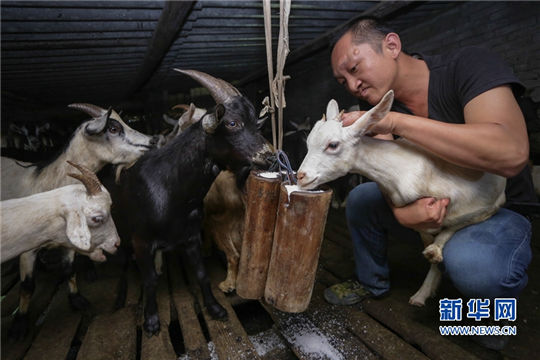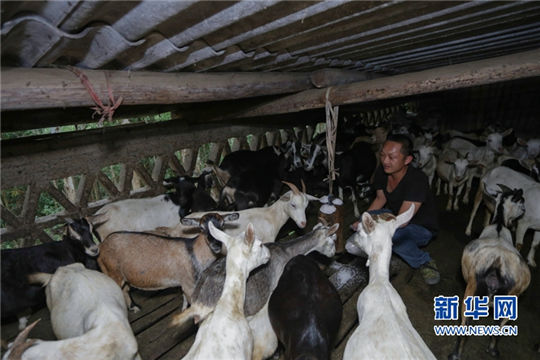

When Hong Fu got his first goat, he didn't think much of it. He simply thought its milk might help his sick father regain his strength.
But tending goats has turned out to be a vocation and a ticket out of poverty for the man from rural Changtai in South China's Fujian province.
Hong now has a flock of more than 130 animals, which makes him an annual income of over 40,000 yuan ($6,000), enough to provide a comfortable life for his family.
Though Hong's new career as a livestock farmer has proved to be a good move, the circumstances that pushed him into it were anything but fortunate.
Like millions of people from rural China, the Changtai native used to make a living as a migrant laborer in the city.
Though hampered by disability due to deformities to his hands and mouth, Hong used to eke out a slender income to support himself.
But this life came to a sudden end in 2012, when his family got the terrible news that Hong's father, Hong Songbao, had been diagnosed with cancer of the esophagus.
Songbao's life was fortunately saved by surgery, but Fu was forced to quit his job in the city and return to the country to care for his frail father.
It was soon after his return that a neighbor suggested to Fu that goat's milk might help his father make a quicker recovery, and he bought his first she-goat.
After a few weeks, Fu found that getting up with the birds every morning to milk his goat suited him quite well, and he sensed this could be a relatively easy way to make money.
So he bought a few more goats, and started his new life as a farmer.
Hong's chance to help his family escape from their impoverished state came in 2015, when the local government implemented the precision poverty alleviation campaign launched by China's central government.
Unlike previous policies, which used a "one-size-fits-all" approach to poverty relief, the new campaign treated each family individually according to its specific needs, providing them with the specific support they needed to get back on track.
On top of financial subsidies, the Disabled Persons' Federation also provided Hong with a loan of 70,000 yuan to help him expand his business.
Hong used the money to buy yet more goats and renovate his sheepfold in Guming Mountain, three kilometers from his home.
The extra income his new flock has provided has allowed Hong to pay off his debts, escape the clutches of poverty, and even redecorate his family home.
But the threat of poverty still hangs over Hong and his family. If his father were to fall sick again, he worries that he wouldn't be able to afford the medical bills.
"Every goat matters to me," he said.
Illness is a major cause of poverty among China's rural population. As of the end of 2015, over 44 percent of impoverished people in rural areas suffered from some form of illness, statistics from the National Health and Family Planning Commission showed.
An improved healthcare system is key to preventing families like Hong's from falling into poverty again.
 |
|
Hong Fu feeds a lamb with salt to treat dyspepsia. [Photo/Xinhua] |
 |
|
Hong Fu's sheepfold is packed with over 130 goats [Photo/Xinhua] |